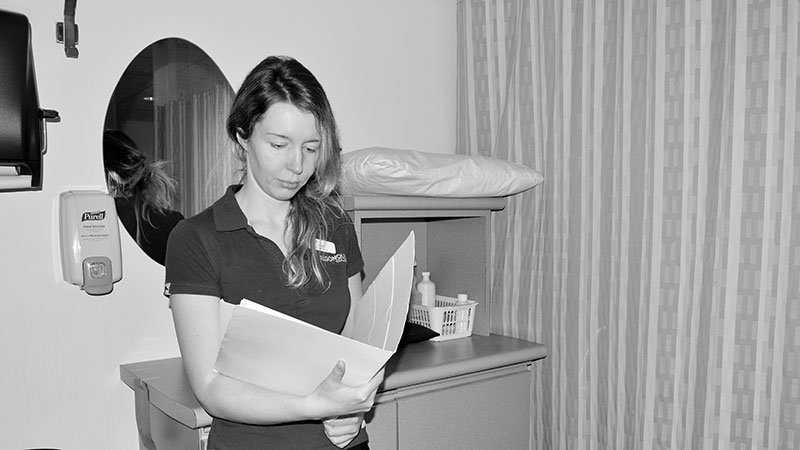By Christine Roy

Not every program uses people to learn a skill, but Algonquin’s massage therapy program does it every day.
“It’s a clinic for students to work on the general public,” explains Ian Dolmage, a professor of the program. The clinic has its own site just like the health center and third year students are on staff.
The Algonquin massage clinic offers students a different option to relax, relieve muscle tension, and lead a healthier lifestyle through knowledge of their bodies.
Located in J109, the massage clinic is open during the evenings from Mon. to Fri., between 4:15 p.m. and 6:00 p.m., starting in Sept. until May.
For some, there’s always the sense of shyness that comes with the idea of disrobing in a room with a stranger. Although these are valid concerns, the first thing a new client should realize is that it is their body and the massage session is tailored to their needs and comfort level. If the pressure is too firm, it’s always okay to inform the massage therapist.
Each case and person are different. A massage therapist–or MT–will tailor their techniques to better fit their client’s needs. An assessment chart is used to keep track of a client’s massage history. By keeping records on a client’s session history, the MT will continue with a long-term treatment plan to make certain that the massage treatment remains at its most effective.
One common treatment integrated into a massage is trigger point therapy. Often, areas of congestion in the muscles due to tension or overuse will cause points of pain that will be felt in a different area. For example, a trigger point located in the neck may cause headaches. Once that trigger point is found, the client will mention a shooting pain heading towards a different section on their head.
The MT will then use a technique to help break up that area of congestion, but some trigger points can be quite stubborn. Long-term treatment will definitely bring the client better results.
The important thing to remember is that being honest with an MT is crucial. It is common for an MT to ask if their client is using any medications or might be pregnant. Thanks to their training, the MT will know if massage is appropriate or not recommended for their clients.
If massage isn’t recommended, the MT may find it’s in the client’s best interest to bypass the appointment and reschedule.
“It doesn’t happen often but we have done it,” Dolmage admits, explaining that if a client has any doubt, they should definitely ask their doctor before proceeding with a massage.
The health of the clients and the MTs is always kept in consideration. If a client has the flu or a cold, for everyone’s benefit it’s best to reschedule and err on the side of caution. A sanitary environment, free of germs is good for everyone.
Professionalism among the clinic’s staff, in presentation and knowledge, helps build the reputation that MTs follow a strict set of ethics in regards to their field.
Appointments are made by email or telephone and sessions can go up to one hour and 15 minutes. During that time, the MTs on staff will spend about 40 to 50 minutes assessing their client’s health history, taking their blood pressure and determining whether or not the client is there for a focused massage session or in need of a more relaxing technique.
The cost of an appointment is $30 and the clinic accepts cash, debit and credit cards as payment.


